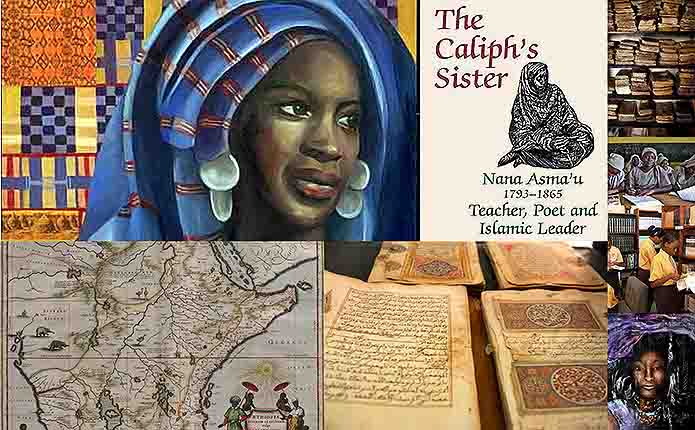Nana Asma’u was a pioneering African Muslim woman who lived in the 19th century in what is now Nigeria. She was a renowned poet, educator, and leader who played a key role in preserving and promoting Islamic culture and education, especially for women.
Born in 1793 in Gobir, in what is now the northern Nigerian state of Sokoto, Nana Asma’u was the daughter of the famous Islamic scholar and political leader, Usman dan Fodio. Her father was a devout Muslim who led a movement to establish a new Islamic state in the region, which later became known as the Sokoto Caliphate.
From an early age, Nana Asma’u showed a keen interest in Islamic learning and literature. She studied the Quran, hadith (sayings of the Prophet Muhammad), and other Islamic texts under the tutelage of her father and other scholars. She also became a gifted poet and writer in the Hausa language, which was widely spoken in the region.
As a young woman, Nana Asma’u began to take an active role in promoting education and literacy among women in the Sokoto Caliphate. She established a network of women’s schools, known as jirgas, where girls and women could learn to read and write in Arabic and Hausa. She also wrote poetry and prose to inspire and educate women, and encouraged them to take an active role in Islamic society and culture.

One of Nana Asma’u’s most important contributions was her collection of poems, known as the “Girgam,” which she composed over several decades. The Girgam consists of over 60 poems that celebrate Islamic faith, culture, and history, and promote social justice, equality, and compassion. Many of these poems were written in the form of dialogues between male and female characters, which challenged traditional gender roles and stereotypes.
Nana Asma’u’s role as a leader and educator was not without controversy. She faced opposition from some conservative elements who believed that women should not be involved in public life or education. However, she persevered in her mission, and her work had a lasting impact on Islamic culture and education in the region.
Nana Asma’u’s legacy continues to inspire women and men in Africa and beyond. Her poems and writings are still studied and celebrated, and her vision of a just and inclusive Islamic society remains relevant today. In recognition of her contributions, Nana Asma’u has been honored by the Nigerian government and recognized as a national heroine.
In recent years, there has been renewed interest in Nana Asma’u’s life and work, both within Nigeria and internationally. Scholars and activists have highlighted her contributions to Islamic feminism and women’s education, and have called for her to be recognized as a role model for young women in Africa and beyond.
In a world where women’s voices and achievements have often been overlooked or silenced, Nana Asma’u’s story serves as a powerful reminder of the importance of women’s leadership and empowerment, and of the vital role that women have played in shaping history and culture.








